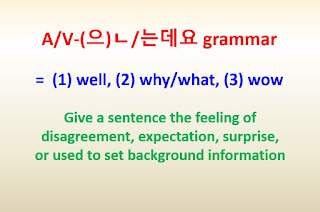Korean ㄷ, ㅂ, ㅅ-irregular verbs and adjectives (Part 1)
Overview- Similar to English, Korean also has irregular verbs and adjectives.
- The regularity/irregularity depends on the stem of the verbs and adjectives that is subject to variation.
- Verbs and adjectives whose stem do not change, "regardless of the sound of the following suffix", are called regular verbs/adjectives
- Verbs and adjectives whose stem varies "depending on the sound of the following suffix" are called irregular verbs/adjectives.
- There are 7 irregular conjugations in Korean: ㄷ, ㅂ, ㅅ, ㅎ, 르, ㄹ, ㅡ
- In this lesson, we will focus on the 3 ㄷ-, ㅂ-, and ㅅ-irregular conjugations first. The remained 4 irregular conjugations can be found in
the next lesson.1. ㄷ-irregular --> ㄹ
- Irregular verbs ending in ㄷ, ㄷ --> ㄹ when followed by an ending that begins with a vowel.묻다 (ask) --> 묻습니다 --> 물어요 --> 물으면
걷다 (walk) -->걷습니다 --> 걸어요 --> 걸으면
듣다 (listen) -->듣습니다 --> 들어요 --> 들으면
싣다 (load) --> 싣습니다 --> 실어요 --> 실으면
깨닫다 (realize) -->깨닫습니다 --> 깨달어요 --> 깨달으면
음악을 들으면서 운동해요.
I listen to music while playing sports.
그 여자에게 전화번호를 물어봤어요.
I asked that female for her phone number.
- Not all verbs ending in ㄷ are irregular. 닫다 (close) --> 닫습니다 --> 닫아요 --> 닫으면
받다 (receive)--> 받습니다 --> 받아요 --> 받으면
믿다 (believe) -->믿습니다 --> 믿어요 --> 믿으면
얻다 (gain) --> 얻습니다 --> 얻어요 --> 얻으면
문을 좀 닫아 주세요.
Please close the door.
어제 택배물을 받았어요?
Did you receive the parcel yesterday?
그런 사람을 믿다니 내가 글렀어요.
It's my mistake that I trusted him.
2. ㅂ-irregular --> 오 or 우- Irregular verbs/adjectives ending with ㅂ, ㅂ --> 오 or 우 when added to an ending that begins with a vowel. 돕다 and 곱다 are the only 2 words that changes to 오, while all others change to 우.쉽다 (easy) --> 쉽습니다 --> 쉬워요 --> 쉬우면
어렵다 (difficult) -->어렵습니다 --> 어려워요 --> 어려우면
맵다 (spicy) --> 맵습니다 --> 매워요 --> 매우면
덥다 (hot) --> 덥습니다 --> 더워요 -->더우면
춥다 (cold) -->춥습니다 --> 추워요 --> 추우면
무섭다 (scary) --> 무섭습니다 --> 무서워요 --> 무서우면
무겁다 (heavy) --> 무겁습니다 --> 무거워요 --> 무거우면
가볍다 (light) -->가볍습니다 --> 가벼워요 --> 가벼우면
밉다 (hateful) -->밉습니다 --> 미워요 --> 미우면
굽다 (roast) --> 굽습니다 --> 구워요 --> 구우면
눕다 (lie down) --> 눕습니다 --> 누워요 --> 누우면
그립다 (miss) --> 그립습니다 --> 그리워요 --> 그리우면
차갑다 (cold) --> 차갑습니다--> 차가워요 --> 차가우면
뜨겁다 (hot) --> 뜨겁습니다 --> 뜨거워요 --> 뜨거우면
싱겁다 (tasteless) --> 싱겁습니다 --> 싱거워요 -->싱거우면
아름답다 (beautiful) --> 아름답습니다 --> 아름다워요 --> 아름다우면
어둡다 (dark) --> 어둡습니다 --> 어두워요 --> 어두우면
*곱다 (lovely) --> 곱습니다 --> 고와요 --> 고우면 --> 고운
*돕다 (help) --> 돕습니다 --> 도와요 --> 도우면 --> 도운
날씨가 추워서 집에 있었어요.
It's cold outside so I stayed at home.
저는 매운 음식을 싫어해요.
I don't like spicy foods.
커피가 뜨거우니까 조심하세요.
The coffee is hot, please be careful.
여기서 보면 그 경치가 가장 아름다워요.
The view is the most beautiful from here.
- Not all verbs/adjectives ending with ㅂ are irregular 입다 (wear)--> 입습니다 --> 입어요 --> 입으면
잡다 (catch) --> 잡습니다 --> 잡아요 --> 잡으면
좁다 (narrow) --> 좁습니다 --> 좁아요 --> 좁으면
접다 (fold) --> 접습니다 --> 접아요 --> 접으면
집다 (pick up) --> 집습니다 --> 집어요 --> 집으면
씹다 (chew) --> 씹습니다 --> 씹어요 --> 씹으면
뽑다 (select, hire) --> 뽑습니다 --> 뽑아요 --> 뽑으면
이 옷을 입어 보세요.
Try these clothes.
내 손을 잡아라.
Catch my hand.
집은 접지만 깨끗해요.
The house is small but clean.
우리는 50명의 신입 사원을 뽑을 예정이다
We are planning to hire 50 new employees.
3. ㅅ-irregular --> (omitted)-
Irregular verbs/adjectives ending with ㅅ, ㅅ is omitted when added to an ending that begins with a vowel.잇다 (connect) --> 잇습니다 --> 이어요 --> 나아서 --> 이으면
낫다 (get better) --> 낫습니다 --> 나아요 --> 나아서 --> 나으면
붓다 (swell, pour) -->붓습니다 --> 부어요 --> 부어서 --> 부으면
긋다 (draw a line)-->긋습니다 --> 그어요 --> 그어서 --> 그으면
젓다 (stir) --> 젓습니다 --> 저어요 --> 저어서 --> 저으면
짓다 (build, write) --> 짓습니다 --> 지어요 --> 지어서 -->지으면
모기가 물어서 눈이 부었어요.
A mosquito bit me, so my eye became swollen.
컵에 커피와 크림, 설탕을 넣고 저어요.
I put coffee, cream, and sugar in the cup and stir it all together.
감기가 다 나았어요?
Did you get better from the cold?
이 노래를 누가 지었어요?
Who wrote this song?
동생이 이야기하면 친구들이 웃어요.
When my brother tells a story, his friends laugh.
- Not all verbs/adjectives ending with ㅅ are irregular. 웃다 (laugh) --> 웃습니다 --> 웃어요 -->웃어서 --> 웃으면
씻다 (wash) --> 씻습니다 --> 씻어요 --> 씻어서 --> 씻으면
벗다 (take off) --> 벗습니다 --> 벗어요 --> 벗어서 --> 벗으면
빗다 (comb) --> 빗습니다 --> 빗어요 --> 빗어서 --> 빗으면
빼앗다 (take by force) --> 빼앗습니다 --> 빼앗어요 --> 빼앗으면
농담을 듣고 한바탕 크게 웃어요.
I have a good laugh at joke.
그 사람이 내 물건을 빼앗았어요.
He took my stuffs away.
밥 먹기 전에 손을 꼭 씻어야 해요.
You have to wash your hands before having a meal.
Label: Grammar Lv1










